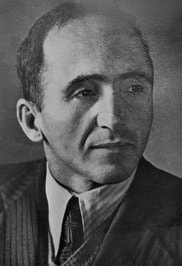Death of Khachik Dashtents (March 9, 1974)

A survivor himself, Khachik Dashtents was one of the writers who resurrected the theme of the genocide in Soviet Armenia after the Stalin years. He was also an accomplished translator of William Shakespeare and other classics of the English language.
Born Khachik Donoyan in the village of Dashtadem, in the region of Sassoun, on May 25, 1910, he lost his parents during the genocide. From 1916 to 1926, he lived in the orphanages of the Armenian Committee of Moscow and the Near East Relief (NER) in Kars, Stepanavan, Tiflis, and Leninakan (now Gyumri).
He received his education in the NER-managed orphanage of the Polygon, in Leninakan. After graduation, he worked as teacher and headmaster in the villages of Horom and Sogyutli (now Sarnaghpyur), in the region of Leninakan, from 1927-1929. Like many Armenian writers, he started his literary career writing poetry. His first poem appeared in the newspaper Banvor of Leninakan in 1928. He adopted the pseudonym Dashtents after his birthplace.
He entered Yerevan State University and graduated from the Faculty of History and Philology in 1932, when he published his first book of poetry, Book of Songs. He worked for two years at the editorial offices of the newspaper Avangard, and in 1934 he published his second book, Spring Songs. In the same year he became a member of the Writers Union of Armenia. His third collection of poetry, Flame (1936), generated too much polemics at a time where literary discussions had degenerated into political persecution and the Stalinist purges were about to start. He abandoned Yerevan and left for Moscow, where he entered the English section of the Institute of Foreign Languages.
Upon graduation in 1940, Dashtents returned to Armenia and settled in Yerevan, where he worked in the literary field until the end of his life. He realized his poetic qualities through translation, even though he continued writing and publishing poetry of his own. He translated Shakespeare’s The Comedy of Errors, The Taming of the Shrew, The Twelfth Night, The Merry Wives of Windsor, Richard III, Julius Caesar, King Lear, and Romeo and Juliet, Henry Longfellow’s Song of Hiawatha, Robert Browning’s The Pied Piper of Hamelin, William Saroyan’s My Heart Is in the Mountains, and others.
He also taught English language, literature, and literary translation at Yerevan State University (1940-1941), the Pedagogical Institute of Foreign Languages Valery Bryusov (1941-1948), and the Polytechnical Institute Karl Marx (1960-1966, now the State Engineering University of Armenia). He wrote English textbooks for schools of Armenia and Armenian textbooks for schools of the Diaspora. From 1965-1974 he was a senior researcher at the Shakespeare Center of the Institute of Art of the Academy of Sciences of Armenia. In 1965 he defended a doctoral dissertation on Lord Byron and his Armenian connections, about which he had published the monograph Byron and the Armenians in 1959.
In the meantime, Dashtents’ novel Khodedan (1950), at a time when the tragedy of the genocide and the survival of the people of Sassoun had been condemned to silence, turned his name a familiar one both in Armenia and the Diaspora. In fact, the novel had seven editions in the 1950s, three of them in Yerevan (1950, 1956, 1960) and the remaining four in Beirut (1951, 1958) and Cairo (1958, 1959), a rare feat in Armenian publishing annals. His novelistic project would come to an end with The Call of the Villagers, published posthumously in 1979, where he depicted the struggle of the Armenian fedayees against Turkish tyranny.
Khachik Dashtents received the honorific title of Emeritus Worker of Culture of Armenia (1967) and a certificate of merit of the Presidency of the Supreme Soviet of Armenia (1970). In 1974 he was elected a member of the Shakespearean Society of Weimar (Germany) for his services to the study of William Shakespeare and his translations of the Bard.
He passed away on March 9, 1974, in Yerevan.

